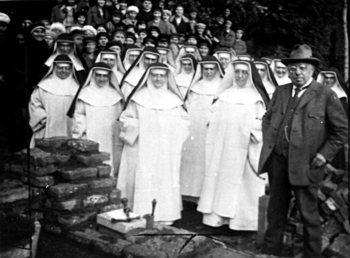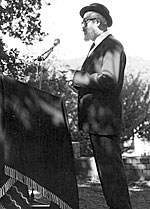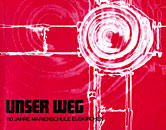Ein kleines Buch mit dem Titel „Emmy’s Story“ erinnert an Emmy Kaufmann verh. Golding, die nach dem Novemberpogrom 1938 mit ihrer Familie die Voreifel verlassen musste und in England eine neue Heimat fand. Vor 15 Jahren schrieb sie ihre Lebensgeschichte nieder, die nun von ihrem Sohn, Anthony (Tony) Golding, im Selbstverlag publiziert und der Mutter im Mai zum 96. Geburtstag überreicht wurde. Nur wenige Tage danach verstarb die Autorin. Da die jüdische Dame bis zu ihrem Tode einen guten Kontakt zur Bevölkerung von Kommern hatte, waren viele Dorfbewohner sehr betroffen, als sie von deren Tod am 8. Juli 2010 hörten.
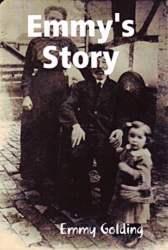 Für die rheinische Regionalhistorie ist die Ortschaft Kommern wegen ihrer einstigen Judengemeinde bedeutsam. Sie ist seit dem 16. Jahrhundert nachweisbar und galt noch nach dem 1. Weltkrieg als orthodox-gläubig. Kommern liegt am nordwestlichen Rand der Eifel und ist ein Ortsteil der Stadt Mechernich im Kreis Euskirchen in Nordrhein-Westfalen. Von architektonischer Bedeutung ist heute das geschlossene Fachwerkensemble im historischen Ortskern.
Für die rheinische Regionalhistorie ist die Ortschaft Kommern wegen ihrer einstigen Judengemeinde bedeutsam. Sie ist seit dem 16. Jahrhundert nachweisbar und galt noch nach dem 1. Weltkrieg als orthodox-gläubig. Kommern liegt am nordwestlichen Rand der Eifel und ist ein Ortsteil der Stadt Mechernich im Kreis Euskirchen in Nordrhein-Westfalen. Von architektonischer Bedeutung ist heute das geschlossene Fachwerkensemble im historischen Ortskern.
Führend war für ein Jahrhundert die portugiesisch-sefardische Familie Levano, deren Schicksal bereits an anderer Stelle dargestellt wurde. Zu den alteingesessenen jüdischen Familien gehörte auch die Familie Kaufmann, die seit Beginn des 19. Jahrhunderts hier nachweisbar ist und deren letzte Familienvorstände Isaac und Sigmund Kaufmann (bis 1939) waren. Das letzte Familienmitglied, das noch in Kommern beheimatet war, war Emmy Golding geb. Kaufmann, die vor einigen Tagen im Alter von 96 Jahren in London verstarb. Am 14. Juli erinnerte ich an sie in meinen NEWS:
Tod von Emmy Golding, der „Jewish Lady from Kommern“
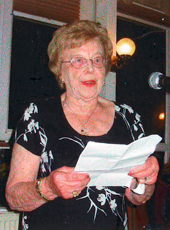 Die älteste jüdische Zeitzeugin von Kommern (bei Mechernich), Emmy Golding geb. Kaufmann, verstarb im Alter von 96 Jahren am 8. Juli 2010 friedlich in einem Londoner Krankenhaus. Nicht nur in meinen NEWS vom 5. April 2008 , sondern auch am 10. Mai 2009 stellte ich sie meinen Lesern als jüdische Zeitzeugin vor.
Die älteste jüdische Zeitzeugin von Kommern (bei Mechernich), Emmy Golding geb. Kaufmann, verstarb im Alter von 96 Jahren am 8. Juli 2010 friedlich in einem Londoner Krankenhaus. Nicht nur in meinen NEWS vom 5. April 2008 , sondern auch am 10. Mai 2009 stellte ich sie meinen Lesern als jüdische Zeitzeugin vor.
Seit vielen Jahrzehnten wohnte siein Edgware, einem Vorort von London, in der historischen Grafschaft Middlesex. Emmy (Emmi) Kaufmann verh. Golding wurde am 10. Mai 1914 in Euskirchen geboren. Ihr Vater Sigmund war Metzger und Viehhändler. Das Elternhaus in Kommern (Commern), Hauptstraße 133, ist für viele, die heute das benachbarte Freilichtmuseum und bekannte Wildgehege besuchen, eine Sehenswürdigkeit.
Nach der Volksschule besuchte Emmi Kaufmann ab Ostern 1925 das Oberlyzeum der Dominikanerinnen in Euskirchen. Den Novemberpogrom 1938 erlebte sie selber nicht in Kommern, sondern bei ihren Verwandten in Sinzenich. Vgl. hierzu die Ausführungen in dem Dokumentationsband „Reichskristallnacht“. Dasselbe Buch gibt auch das wieder, was ihr Vater Sigmund und die Familie Kaufmann erleben mussten. Das genaue Originalprotokoll befindet sich in der Wiener Library von London.
Emmy Golding wohnte nicht weit entfernt von ihrer Cousine Lilly Clyne geb. Kaufmann, die aus Hostel in der Voreifel stammt und vor wenigen Wochen gesegnete 100 Jahre alt wurde. Vgl. meine NEWS vom 26.02.2010.
Sie wohnt noch heute in London-Willesden. Emmys Schwester, Gerda Schwarz, wurde am 9. November 1920 geboren und feierte im Jahre 1938 – wenige Stunden vor der „Reichskristallnacht“ - unbeschwert ihren Geburtstag, ehe sich einige Stunden später der Pogrom ereignete. Sie und ihre Angehörigen fanden in Boston eine neue Heimat. Sie verstarb im letzten Jahr.
Der „Jewish Lady from Kommern“, wie Emmy Golding früher in einigen Ansprachen genannt wurde, gilt unser Gedenken.
Die Erlebnisse von Emmy Golding, zu der ich seit 1980 in persönlichem Kontakt stand, haben meist sehr persönlichen Charakter. Aber die Aussagen, die ihre frühere Heimat betreffen, sind durchaus von regionalhistorischen Interesse und sollen teilweise – mit Erlaubnis von Anthony Golding – auch den Lesern dieser regionalhistorischen Homepage zugänglich gemacht werden:
My home
From pages 5/6
(...) I was born in a small village called Kommern in Germany. It is set in very lovely countryside, south-west of the city of Cologne, at the foot of the Eifel mountains. Kommern is situated in a Valley and surrounded by woodland. The inhabitants lived mostly by farming as at that time there was very little industry, although years before there had been some employment from mines. As a child, I used to climb the hills and go for walks in the woods. Sometimes, I collected fallen cones from the pine trees or we picked berries of various kinds. It was a healthy life. We were a middle-class family involved in business and we had everything we needed. Girls, when they grew up, did not go out to work. They were taught all aspects of good housekeeping and then hoped to find a husband. We did not have holidays as we know them now. Our vacations were spent staying with family. It was a very narrow outlook on life.
Twelve Jewish families lived in the village when I was young. Previous to that, there had been thirty families, but some families had died out and others had gone to live in towns. Köln, or Cologne in English, was the closest big city, about thirty miles away. My family had lived in the village for over two hundred years. We had our own synagogue and cemetery. I remember celebrating the fiftieth anniversary of the foundation of our little synagogue. I was a small child at the time and recall a celebration being held on Shabbat in the synagogue. A dinner was arranged in the hall of one of the local pubs (“Gasthäuser") and on Saturday evening, after Shabbat, a ball was organised. Jewish people came from all the surrounding area to take part in the celebration. Some non-Jewish people took part too. I remember having a large number of visitors in our house. I wanted so badly to have a look at the dancing at the ball, but was not allowed to. On November 10th, 1938, "Kristallnacht" (Crystal Night), our little synagogue was destroyed by fire with all the Sefer Torahs and books in it. Today, only one wall of our lovely little schul is left standing. Services in these small communities were conducted by volunteers.
I was born in 1914 and brought up in the same house in Kommern at 18 Kölnerstrasse in which my father and grandfather had been born. My great-grandfather had bought one house and later purchased the adjoining one, as families werlarge in those days. So it is quite a family history that goes back many years. The house is a Tudor one with six bedrooms.
What the inside looks like now, I don't know, but from the outside it still looks very presentable. My mother always kept the inside very nice and comfortable, although we did not have all the luxuries we have today. Each downstairs room had a Stove that had to be lit every morning. We had a large entrance hall, a living room, an Office containing a telephone and our best sitting room, which was only to be used when visitors came and at holiday time. The kitchen was small with an oven a bit like an Aga that burned brown coal briquettes. Plenty of cooking was done in there. The toilets were outside which was very inconvenient in winter (...).
School in Euskirchen
From pages 18-20
The school I went to in Euskirchen, the main town of the district we lived in, was a convent school. I still remember a lot of the sisters' names. We had a male teacher for geography and one ordinary teacher for sport, a Miss Schulte. I was never allowed to learn to swim, as the child of friends of my parents had drowned. I regret to this day that I am unable to swim. I made up my mind that if I ever had a family, I would make sure my children learned to swim and I carried out this intention.
In the whole of the Lyzeum (today: Gymnasium Marienschule Euskirchen) there were only five or six Jewish girls. I had two in my class but my best friend was always Gerta Krusing, who I had met at the local school in Kommern. I enjoyed my school years and was very sorry when my parents made me leave when I was nearly sixteen in 1930. They actually wanted me to leave when I was 15 so I could help in the business but I went to a bookshop and bought the books I needed for the next year, which forced them to let me stay on. The little English I learned at the Lyzeum stood me in good stead when I came to England. My sister followed me to that school. I said previously that physically, we had everything we needed, but mentally we could have had more Stimulation.
Just a few years before I went to high school my cousins, Eva and Lilly, were growing up in the village. Their family, especially the unmarried aunts and one uncle, did not want them to go to elementary school. A private school was started in the village with one teacher, so upper-class children in the village went to this school. I am still glad that I went to the Lyzeum. One teacher in the private school had to teach all age groups. There was one Jewish girl my age in Kommern, but her family moved to Düren, a nice town not too far away.
I remember the day I started school in Euskirchen, at the age of eleven. I had to cycle to the nearest Station. I had a new bicycle for my birthday and was so looking forward to cycling the twenty minutes to the Station and then getting the train for half an hour to Euskirchen. I enjoyed very much being on the train with all the other boys and girls and we had great fun. Sadly, however, it was short-lived. A bus started going from Kommern direct to Euskirchen. It left at seven o'clock and arrived shortly before eight, when my lessons started. This was much more expensive than the train, but my parents were determined that I should use it and nothing could make them change their minds. I felt upset and isolated because I was the only child on the bus. My mother always overprotected me as a child as she felt I was of a delicate disposition. I missed all the fun but could not do anything about it.
My school mates came, as I did, from the surrounding area and Euskirchen itself. Farmers' daughters and industrialists' daughters, we all came from the middle- class homes of business people. I was a fair Student and particularly enjoyed geography, French and English. My parents had to pay a monthly school fee and my mother grumbled every month at how much it was costing. It upset me greatly and I promised myself that I would never do this to my children. I would have liked to stay on at school but was told that I was needed at home. I was brought up in a very religious atmosphere - no work and no travelling on Shabbat. I had never eaten in a restaurant until I came to England.
I had to go to school on Saturday mornings, although I didn't have to write. How was I to overcome this? My parents found a religious family in Euskirchen, and I stayed with them from Friday after school until Sunday morning. Their name was Schweizer. I shared a bedroom with the daughter of the house. They were very good to me and I learned a great deal there. The eldest daughter, Lina, got married to a rabbi in France. I have never forgotten that they sent me a card from their honeymoon in the south of France. I felt that I would never see the places they visited, but things changed for me too(....).
Purim and Simchas Torah
From Page 22:
Times have changed so much. When I was young, girls would never go out by themselves or to a dance without an escort. To go alone into a pub would have given you a bad name. The result was that one went with one's parents. We very often took my Catholic friend Gerda, who I have mentioned already, with us. We danced with the young men from our area. Jewish and non-Jewish people mixed very comfortably together.
On the festivals of Purim and Simchas Torah young Jewish people from the whole area formed a committee and hired a hall, usually in Euskirchen, and organised a big dance where old and young got together and danced the night away. Often the young people wore masks. Again, I was taken by my parents. I met boys there and many couples met there and later married. A matchmaker wasn't needed in those days. We had a Jewish paper that was circulated all over Germany, and I remember there were pages of people who advertised wanting to meet somebody to share their life with. Sadly, I didn't attend many of those balls. One had to be eighteen before one could go, but I remember well that my mother had a very nice evening dress made for me for these occasions. It was a black taffeta dress with a full skirt. The neck was fairly low with a red rose for decoration. I danced with all the Jewish boys and had a lovely time (...).
No danger ??
From pages 25/26
In 1933 Hitler, who had founded the Nazi Party a few years before, gained power in Germany. We had always hoped that he would never achieve this but, at that time, there was a great deal of unemployment in Germany. Some people didn't have enough to eat. Hitler promised them full employment and a better life and they regarded him as a saviour since he promised all sorts of things. The biggest worry the Jews had was the hatred and propaganda he put out against us. I knew that he had written a book called "Mein Kampf” ("My Struggle"). If we had read this book we would have known that he wanted to extinguish all the Jews, but we could not believe that anything like that could ever happen in cultured Germany.
I knew one particular person who had studied dentistry. He had just finished and set up a surgery in Cologne in 1933. When the Nazis gained power, he left Germany and eventually came to England. Some people were far-sighted enough to leave but my parents, whose family had been living in Kommern for four generations, felt that Hitler's rule would be short-lived. Also, we were so German-orientated. We had hardly any connections abroad so it was very difficult for us to get out. As I said before, we had lived among the German people for so many years that one could not imagine that anything could happen to us. My father had fought in the First World War and had been rewarded the Iron Cross and a medal fighting on the Russian and Finnish fronts. How could anything happen to us? (...)
“Reichskristallnacht”
From pages 33/34
(...) In about September 1938, under duress, we sold our big house and land in Kommern because Jews were no longer allowed to own land. The money from the sale had to be put into a bank and the Nazis allowed you a small amount to live on each month. In fact, our money was more or less confiscated. We moved into a very small house in the nearby village of Sinzinich belonging to my Uncle Julius. To make room for us Uncle Julius and his family moved in with Uncle Jacob, who lived next door. One felt a little more secure to be together with one's family.
But things went from bad to worse. "Kristallnacht" came in late 1938 in which all Jews suffered. (It was called that because of all the windows that were broken in Jewish premises). My father was put into prison because he was Jewish. The womenfolk were thrown out of their house. We were all thrown out into the street at night. It was November 10th and fairly cold. Nobody would take us in because people were afraid even to talk to us. We felt like wandering gypsies. We passed other Jewish houses and shops. They had been plundered and their belongings thrown out onto the street. So there we were, my mother, my sister and myself and all the rest of the women without any of our men. We felt like outcasts and didn't know what to do. A few men had managed to hide with the priests. One of these was my cousin, Leo Horn, the son of my father's sister, Ida. Also, here and there, a German family took pity on us but most of them were too afraid to be seen in our Company. We eventually went back to my uncle's house but our father was still in prison just because he was a Jew. There was a little stream running in front of the house. The first thing we saw was a great part of our belongings in the stream(...).
Im Jahre 1939 wanderte die Familie Kaufmann nach England aus und entging somit dem Holocaust. Freundschaftliche Kontakte zu nicht vom Nazismus infizierten Nachbarn in Kommern blieben bestehen.
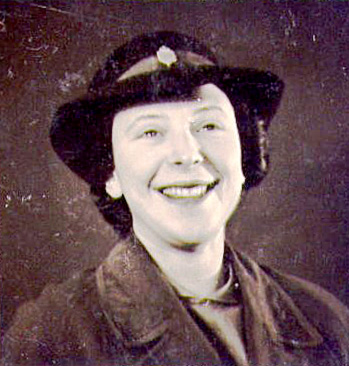
Weiterführende Links:
Wie die Juden von Kommern endlich zu ihrem Gedenkstein kamen
Aus der Chronik des Gymnasiums Marienschule Euskirchen
